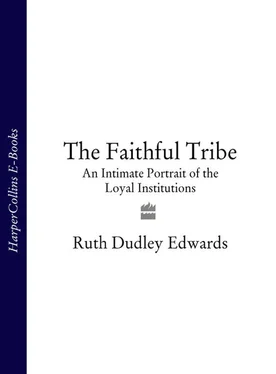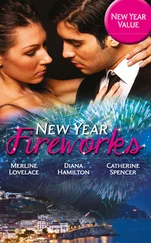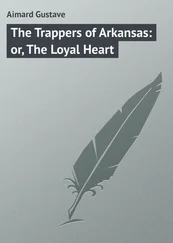Both lots of would-be rioters shared a deep frustration because cross-community agreement over the parade had removed the excuse for serious trouble. Like hooligans everywhere, they were dying for a rumble. And assiduously they pressed the buttons they knew would wind up the other side. ‘Fenian bastards’ and ‘Provo scum’ calls were balanced by ‘Fuckin’ Orangies’ and subtleties like ‘Billy Wright, bang bang’ – an allusion to the killing in the Maze prison of hard-line loyalists’ favourite murderer. Leaping up behind the police lines, they made throat-cutting gestures at each other, whistled their preferred national anthem and waved their colours. Yet balking them at every turn was their mutual enemy, the ever-present and highly efficient RUC. So as they were blocked by riot police from climbing over the barriers into each other’s territory, both sides screamed ‘SS RUC’, a chant first developed by republicans.
Driving away from Derry with my friend Henry, he said: ‘Tomorrow I’ll show you the bull-pens.’ Obediently, I waited until Sunday morning to be enlightened. At the local cattlemart I surveyed the rows of heavy steel pens. ‘You get two bulls together and they don’t know anything except that they have to fight,’ said Henry. ‘And they’ll break through cement walls to get at each other. All you can do is stop them seeing each other. That’s what should have happened yesterday.’
‘That’s all very well, Henry,’ I said, ‘but there would have been an outcry from the Bogsiders about the police hemming them in and there would have been violence with the loyalists. And all this with Chris Patten looking down at the police from above.’
‘What drives me mad about politicians – and I’ve no reason to think Patten’s an exception,’ said Henry, as we squelched back from the pens, ‘is that they won’t face reality. Now what you had yesterday were two lots of young fellas with hundreds of years of breeding telling them to fight each other. It’ll take another hundred years to breed out that tribalism. We have to face what we’re dealing with. And what we’re dealing with are bad bastards who are egged on by worse bastards who nurture what nature’s already given us. If people behave like animals, they have to be treated like animals.’
I thought of Henry throughout the afternoon in Belfast as I watched little children marching along with the Republican parade commemorating the twenty-seventh anniversity of internment alongside fife-and-drum bands – some wearing camouflage gear – which were blaring out the tunes of famous songs about brutal Brits and heroic Irish and martyred dead. Four or five youngsters sat on the edge of the platform in the lorry outside Belfast City Hall and cheered and clapped a collection of speeches from angry revolutionaries, who included an implacable ETA spokeswoman. When they had finished applauding Gerry Adams’s vitriolic attacks on the RUC and the British occupying forces and the unionists, they cheered again when he sent them away with instructions to agitate until the republican wish-list had been fully granted. All the kids grasped that Sunday afternoon was that their tribe was good, the other one was bad. And every time they saw policemen or Land Rovers – there to keep them safe from loyalists – they shouted ‘SS RUC’. Whatever the politicians say, while we need the bull-pens, we’re a long way from peace.
* This is as good a place as any to clear up a problem of language that is a running sore today in Northern Ireland. Catholics are those who believe their Church has evolved from the ancient Christian Church; Anglicans, many other Protestant sects and Orthodox Eastern Churches come into this category, along with those who acknowledge the Pope as head of the Church, and who have historically therefore been termed ‘Roman Catholics’. ‘We stand,’ says the Orange Order, ‘for the true Catholic Faith and we deny any church the right to make exclusive claims thereto. The title “Catholic” belongs to all who own the Lord Jesus Christ as Saviour and honour Him as Lord. They are all by His grace members of His Catholic or Universal Church. That saving grace is confined to no single sect.’
Yet since Rome has always insisted it had exclusive use of the term ‘Catholic’ and since the belief that it is the one, true Catholic Church has been a principle of Roman Catholic teaching in Ireland, it is in the psyche of the Irish Roman Catholic that he is a Catholic, and that anyone calling him a Roman Catholic is in some obscure way being offensive. A Southern Irish friend of mine recalled hearing the term first in the 1960s in television coverage of an Ian Paisley speech; he and his other teenage friends gazed at each other indignantly. ‘What does he mean Roman Catholic?’ said one of them. ‘We’re not Italians.’
Orangemen are asked not to take offence but, in the interest of saving trees, throughout this book I use ‘Catholic’ to mean ‘Roman Catholic’.
* Irish for ‘vision poem’. The Irish Catholic Utopia was a country from which all the Protestants would have been evicted.
† Protestants call Catholic churches chapels.
* An Orangeman asked me to point out that such merchandise has nothing to do with the Orange Order.
† I was wrong. Paisley did not join the Independents when he fell out with the Orange Order. He is, however, an Apprentice Boy.
* Known locally as a heart-attack on a plate, this is normal rural fare and can include bacon, eggs, sausages, tomatoes, mushrooms, fried bread and potato bread, and is usually accompanied by home-made soda bread, one of the most delicious foodstuffs in the world.
† Ireland has few black residents and Ulster hardly any, so locals are unaware of any ambiguity when they refer to the Blackmen. One July I was standing at a reception desk in a Belfast hotel when an American woman asked if there would be any more marches that summer. ‘Oh yes,’ said the receptionist, ‘the Blackmen parade on the last Saturday in August.’ She continued finalizing the guest’s account and thus missed her astounded and bewildered expression. I thought of setting the tourist right, but decided it was more fun not to.
* I am told that some local Orangemen who are members of the DUP were annoyed at this remark. I am sorry to have hurt their feelings, but I record what I hear.
† I was corrected about this later. It would have been true six or seven years ago: indeed, in 1991 the wife of a Sinn Féin worker brought her children, her sunglasses and a chair with her and watched the parade. In the last few years, however, because of the increase in sectarian tension, Catholics stay away. There would, however, be many stalls and shops manned by Catholics servicing the paraders and onlookers.
* Orangemen describe them as ‘blood-and-thunder’ bands, Catholics (because they dislike them) and loyalist youths (because they love them) call them ‘kick-the-pope’.
† I should have added, ‘or in the Gaelic Athletic Association, which provides a social and sometimes political focus to their lives’.
* I remember particularly the Murley renditions of ‘It’s A Long Way to Tipperary’, ‘Pack Up Your Troubles’ and ‘All the Nice Girls Love a Sailor’.
* A clarifier here. My occasional references to ‘my’ lodge merely denote a friendly relationship and are not intended to suggest that a male-only all-Protestant lodge has taken leave of its senses and admitted as a member a female atheist who was baptized Catholic. I have standing invitations to certain functions there, I’ve eaten there three times and I feel a special gratitude to the brethren for being so kind and welcoming to a nervous outsider.
* Technically, in 1984, the city became ‘Derry’ while the county remained ‘Londonderry’. In practice, Catholics tend to call both Derry and Protestants both Londonderry. Those trying to avoid giving offence call the city Derry/Londonderry and humorists call it Stroke City.
Читать дальше












